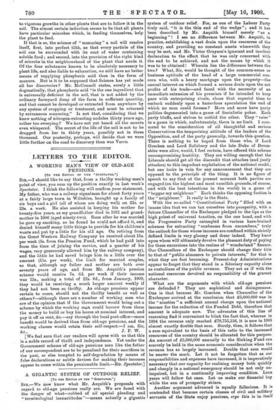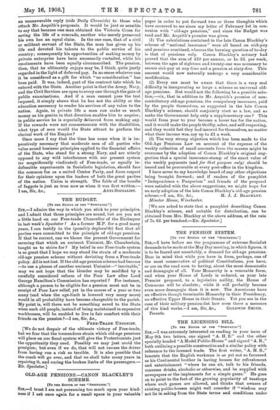A GIGANTIC SYSTEM OF OUTDOOR RELIEF.
[TO THE EDITOR OP THE " SPECTATOR."]
Sin,—We now know what Mr. Asquith's proposals with regard to old-age pensions really are. We are faced with the danger of what—robbed of all special pleading and " terminological inexactitudes "—means actually a gigantic system of outdoor relief. For, as one of the Labour Party truly said, "it is the thin end of the wedge"; and it has been described by Mr. Asquith himself merely "as a beginning " ! I see no difference between Mr. Asquith, in practice, establishing a vast drain upon the resources of the country, and providing no constant assets wherewith they may be met, and Mr. Victor Grayson's ignorant and insolent declaration to the effect that he was only concerned with the end to be achieved, and not the means by which it was to be obtained! Wherein lies the difference between the two ? What, Sir, would be thought of the common-sense or business aptitude of the head of a large commercial con- cern who, with a heavy mortgage upon the property—the annual interest on which formed a serious drain upon the net profits of his trade—and faced with the necessity of an immediate extension of his premises if he intended to keep pace with enterprising rivals, chose that especial time to embark suddenly upon a hazardous speculation the end of which no man could foresee ? More and more have party politics degenerated into a game of Socialistic poker. Each party bluffs, and strives to outbid the other. They " raise" in a game in which, unfortunately, there is no limit. I corn. mend to the consideration of all thoughtful and serious Conservatives the temporising attitude of the leaders of the Opposition, and of the party generally, towards this question. There is nothing to be hoped from those who, if Lord Goschen and Lord Salisbury and the late Duke of Devon- shire were alive, would, I feel certain, have offered this scheme uncompromising hostility. They are willing enough that the Liberals should get all the discredit that attaches (and justly attaches) to this impudent exploitation of the national credit; but one looks in vain for any announcement that they are opposed to the principle of the thing. It is no figure of speech to say that at the present moment both parties are engaged (on the highest and most unselfish grounds, of course, and with the best intentions in the world) in a game of "beggar my neighbour." Each thinks the opposing faction is the " neighbour." It really is the State.
With the so-called " Constitutional Party " filled with an insane idea that we can tax ourselves into prosperity, with a future Chancellor of the Exchequer pledged to the lips as the high priest of universal taxation, on the one hand, and with the Progressive Party entangled in various bare-brained schemes for extracting "sunbeams from cucumbers," truly the outlook for those whose incomes are confined within strictly defined limits is very gloomy and drear indeed. They know upon whom will ultimately devolve the pleasant duty of paying for these excursions into the realms of " wonderland" finance. Our Chancellors of the Exchequer should change their title to that of "public almoners to private interests," for that is what they are fast becoming. Present-day Administrations appear to forget that they stand in a fiduciary capacity alone as custodians of the public revenue. They act as if with the national resources devolved no responsibility of the gravest character.
What are the arguments with which old-age pensions are defended P They are sophistical and disingenuous. One is that because Mr. Goschen when Chancellor of the Exchequer arrived at the conclusion that £5,000,000 was in the " nineties " a sufficient annual charge upon the national income for the reduction of the Funded Debt, therefore that amount is adequate now. The advocates of this line of reasoning find it convenient to blink the fact that, whereas in 1894 the revenue only reached £78,755,156, it is now in 1908 almost exactly double that sum. Surely, then, it follows that a sum equivalent to the basis of this ratio to the increased resources of the country should be allocated for this purpose. An amount of £5,000,000 annually to the Sinking Fund can scarcely be held in the same economic consideration when the revenue has so largely increased. Double that sum would be nearer the mark. Let it not be forgotten that as our responsibilities and expenses have increased, it is imperatively necessary that our capacity for realising money both quickly and cheaply in a national emergency should be not only un- impaired, but in a continually improving condition. Lean years will follow fat ones. Let us make our financial bay while the sun of prosperity shines.
Another argument advanced is equally fallacious. It is contended that because certain classes of civil and military servants of the State enjoy pensions, ergo this is iu- itself
an unanswerable reply (vide Daily Chronicle) to those who attack Mr. Asquith's proposals. It would be just as sensible to say that because one man obtained the Victoria Cross for saving the life of a comrade, another who merely preserved his own has an equal claim. In the one case, that of a civil or militant servant of the State, the man has given up his life and devoted his talents to the public service of his country; consequently his opportunities of making money by private enterprise have been necessarily curtailed, while his emoluments have been equally circumscribed. The pension, then, that he ultimately enjoys may be, I think, quite justly regarded in the light of deferred pay. In no sense whatever can it be considered as a gift for which "no consideration" has been paid. It was, indeed, part of the contract into which he entered with the State. Another point is that the Army, Navy, and the Civil Services are open to every one through the gate of public examinations. And if a man cannot pass the test imposed, it simply shows that he has not the ability or the education necessary to render his services of any value to the nation. Again, in private life a man can make as much money as his genius in that direction enables him to acquire ; in public service he is especially debarred from making any. If the rewards were not commensurate with the disabilities, what type of men would the State attract to perform the clerical work of the Empire?
Once more I say that the time has come when it is im- peratively necessary that moderate men of all parties who value sound business principles applied to the financial affairs of the State, who stand for a strong Navy, and are utterly opposed to any wild interference with our present system (so magnificently vindicated) of Free-trade, or equally in- defensible experiments in Socialistic legislation, should face the common foe as a united Centre Party, and force respect for their opinions upon the leaders of both the great parties of the nation. Union is strength. The fable of the bundle of faggots is just as true now as when it was first written.—















































 Previous page
Previous page